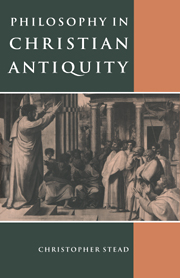Book contents
- Frontmatter
- Contents
- Preface
- List of abbreviations
- PART I THE PHILOSOPHICAL BACKGROUND
- PART II THE USE OF PHILOSOPHY IN CHRISTIAN THEOLOGY
- 8 The debate about Christian philosophy
- 9 Greek and Hebrew conceptions of God
- 10 Proofs of the existence of God
- 11 God as simple unchanging Being
- 12 How God is described
- 13 Logos and Spirit
- 14 Unity of substance
- 15 Substance and Persons
- 16 Christ as God and Man
- 17 Two natures united
- PART III AUGUSTINE
- Bibliography
- Index of Names
- Index of Subjects
12 - How God is described
Published online by Cambridge University Press: 29 September 2009
- Frontmatter
- Contents
- Preface
- List of abbreviations
- PART I THE PHILOSOPHICAL BACKGROUND
- PART II THE USE OF PHILOSOPHY IN CHRISTIAN THEOLOGY
- 8 The debate about Christian philosophy
- 9 Greek and Hebrew conceptions of God
- 10 Proofs of the existence of God
- 11 God as simple unchanging Being
- 12 How God is described
- 13 Logos and Spirit
- 14 Unity of substance
- 15 Substance and Persons
- 16 Christ as God and Man
- 17 Two natures united
- PART III AUGUSTINE
- Bibliography
- Index of Names
- Index of Subjects
Summary
Gregory of Nazianzus has the confidence to demand ‘Are not spirit and fire and light, love and wisdom and righteousness, and mind and reason and the like, names of the First Nature?’ (Orat. 28.13). He goes on to point out that all these names can convey misleading suggestions. Nevertheless they were firmly rooted in Christian tradition. Hence, as we have shown, the common descriptions of God as ‘unknowable’ or ‘indescribable’ are not to be pressed in a literal sense; they do not debar us from shadowing out God's nature by using words drawn from our everyday experience. These words, indeed, could not be avoided, in view of the biblical texts which describe God as Fire, Light, Life, etc. (Deut. 4:24, 1 John 1:5, John 1:4, etc.). But reinterpretation is needed, and the Christian writers tend to refine such bold metaphors; very commonly they retain the notion that God is mind or intelligence, and interpret the other terms as indicating dispositions or activities of the divine mind. At the same time, Neoplatonist philosophers were debating whether or not nous was the proper designation of the First Principle.
It is convenient to distinguish the predicates applied to God as metaphysical and natural, the latter group including both physical and moral terms. Within the first group we have dealt briefly with the descriptions of God as Being, as Unity, and as ultimate Source (Jer. 2:13 etc.). We must now consider the attributes of Mind and Spirit.
- Type
- Chapter
- Information
- Philosophy in Christian Antiquity , pp. 136 - 147Publisher: Cambridge University PressPrint publication year: 1994



